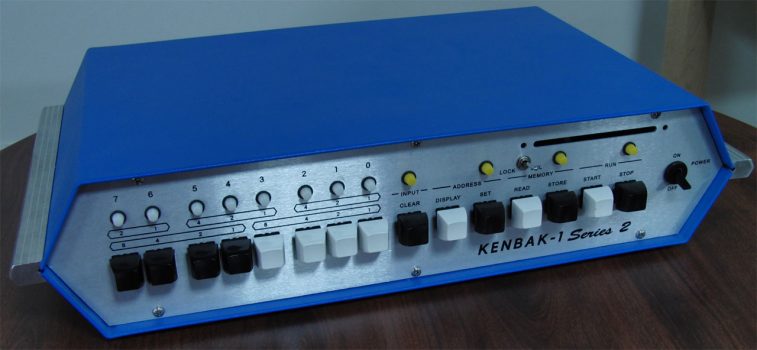
Kenbak 1 - 1971
The Kenbak-1 is considered by the Computer History Museum and the American Computer Museum to be the world’s first “personal computer”, invented by John V. Blankenbaker (1930-) of Kenbak Corporation …
Read More →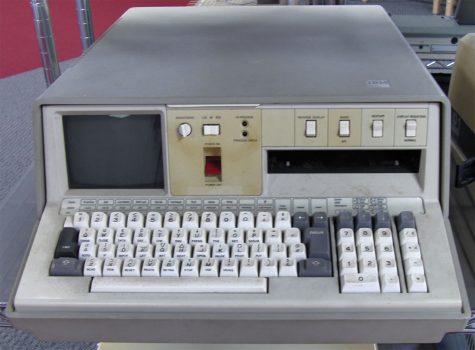
IBM Portable Computer 5100 - 1975
The IBM 5100 was introduced as IBM’s first “Portable Computer” in September 1975, six years before the IBM Personal Computer. It was the evolution of a prototype called the SCAMP …
Read More →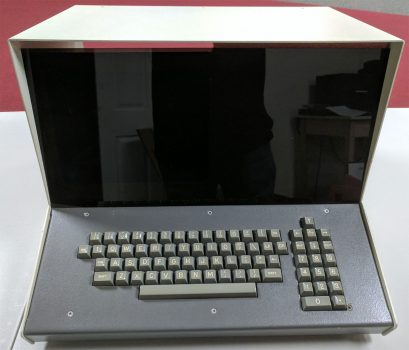
Sphere 1 - 1975
The Sphere I was a personal computer completed in 1975 by Michael Donald Wise and Monroe Tyler of Sphere Corporation, of Bountiful, Utah. The Sphere I featured a Motorola 6800 …
Read More →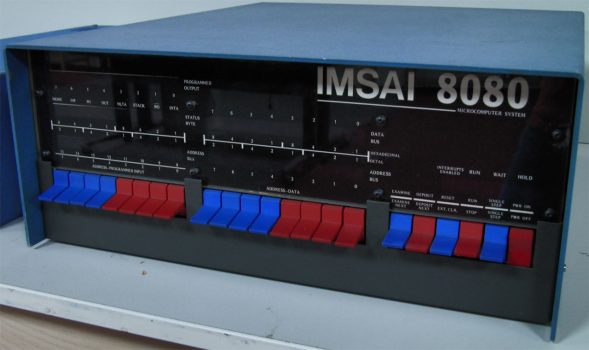
IMSAI 8080 - 1975
The IMSAI 8080 was an early microcomputer released in late 1975, based on the Intel 8080 and later 8085 and S-100 bus. It was a clone of its main competitor, …
Read More →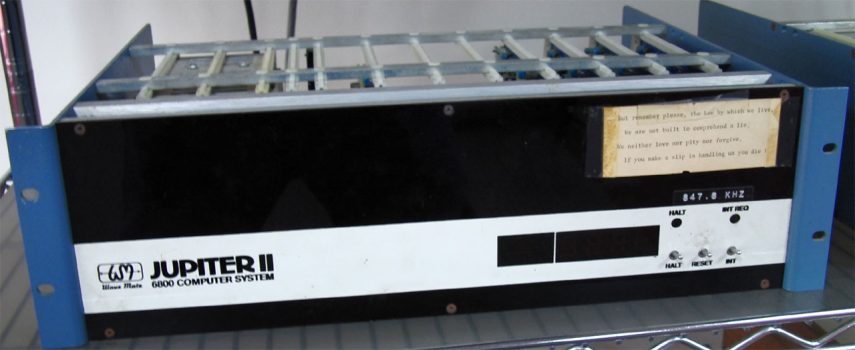
Wave Mate Jupiter - 1976
Ranking among the rarest of artifacts on display at LSIM, this Jupiter system was produced in small numbers by Wave Mate beginning in 1976. Better known for it’s Z80 Bullet SBC, Wave …
Read More →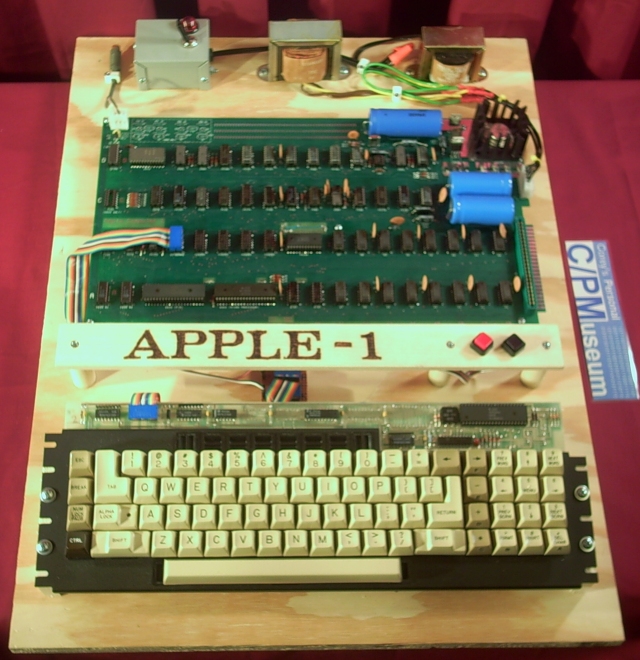
Apple 1 - 1976
Apple Computer 1, also known later as the Apple I, or Apple-1, is a desktop computer released by the Apple Computer Company (now Apple Inc.) in 1976. It was designed …
Read More →Apple ][ - 1977
The Apple II is an 8-bit home computer, one of the first highly successful mass-produced microcomputer products, designed primarily by Steve Wozniak. It was introduced in 1977 at the West …
Read More →TRS-80 Model 1 Level 1 - 1977
The TRS-80 Micro Computer System (TRS-80; later known as the Model I to distinguish it from successors) is a desktop microcomputer launched in 1977 and sold by Tandy Corporation through …
Read More →Atari 2600 - 1977
The Atari 2600 (or Atari VCS before 1982) is a home video game console by Atari, Inc. Released on September 11, 1977, it is credited with popularizing the use of …
Read More →Commodore PET 2001 - 1977
The Commodore PET (Personal Electronic Transactor) is a line of home/personal computers produced starting in 1977 by Commodore International. A top-seller in the Canadian and United States educational markets, it …
Read More →TRS-80 Model 1 Level II - 1978
In March 1978 Tandy introduced the first version of Level II BASIC for the TRS-80 Model 1. A Level 1 to Level II upgrade was available from Radio Shack dealers. …
Read More →Apple ][+ - 1979
The Apple II Plus (stylized as Apple ][+) is the second model of the Apple II series of personal computers produced by Apple Computer, Inc. It was sold from June …
Read More →TRS-80 Model II - 1979
The TRS-80 Model II was a computer system launched by Tandy in October 1979, and targeted at the small-business market. Despite its name, the Model II was not an upgrade …
Read More →Atari 400 - 1979
The Atari 400 and 800 were both announced in December 1978, though they didn’t actually start shipping until late in 1979. Designed primarily as a computer for children, the Atari …
Read More →Atari 800 - 1979
The Atari 400 and 800 were announced in December 1978, though they didn’t actually start shipping until late in 1979. The primary difference between the two models was marketing; Atari marketed …
Read More →Apple /// - 1980
The Apple III (often styled as Apple ///) is a business-oriented personal computer produced and released by Apple Computer that was intended as the successor to the Apple II series, …
Read More →Commodore PET 4000 Series - 1980
In 1980, the 4000-series PETs were launched. These used a larger 12″ monitor with a redesigned CRT controller and also included the enhanced BASIC 4.0, which added commands for disk …
Read More →Commodore PET 8000 Series - 1980
The PET 8000 series, also badged as CBM for Commodore Business Machines, included a new display chip which drove an 80×25 character screen. However, this resulted in a number of software incompatibilities …
Read More →TRS-80 Model III - 1980
In July 1980, Tandy released the TRS-80 Model III. The improvements of the Model III over the Model I included: built-in lowercase, a better keyboard with repeating keys, an enhanced …
Read More →TRS-80 Color Computer 1 - 1980
The Radio Shack TRS-80 Color Computer (also marketed as the Tandy Color Computer and affectionately nicknamed CoCo) is a line of home computers based on the Motorola 6809 processor. Despite …
Read More →Commodore VIC-20 - 1981
The VIC-20 was the first inexpensive color computer available, costing less than $300. was intended to be more economical than the PET computer. It was equipped with 5 KB of …
Read More →Commodore SuperPET 9000 - 1981
The SuperPET SP9000, also known as Micro-Mainframe or MMF9000, was developed in conjunction with the Department of Computer Science of the University of Waterloo in Ontario, Canada. It was primarily …
Read More →IBM PC - 1981
The IBM Personal Computer, commonly known as the IBM PC, is the original version and progenitor of the IBM PC compatible hardware platform. It is IBM model number 5150, and …
Read More →Commodore SuperPET SP9000 - 1981
The last in the Commodore PET series was the SP9000, known as the SuperPET or MicroMainframe. This machine was designed at the University of Waterloo for teaching programming. In addition …
Read More →Commodore 64 - 1982
The Commodore 64, also known as the C64, C-64, C=64, is an 8-bit home computer introduced in January 1982 by Commodore International. It is listed in the Guinness World Records …
Read More →Apple //e - 1983
The Apple IIe (styled as Apple //e) is the third model in the Apple II series of personal computers produced by Apple Computer. The e in the name stands for …
Read More →Apple Lisa - 1983
Apple Lisa is a desktop computer developed by Apple, released on January 19, 1983. It was one of the first personal computers to offer a graphical user interface (GUI) in …
Read More →TRS-80 Model 4 - 1983
The successor to the Model III was the TRS-80 Model 4. It had faster Z80A 4 MHz CPU, a larger video display 80 columns x 24 rows, bigger keyboard, and …
Read More →Commodore Educator 64 - 1983
1983 saw Commodore attempt to compete with the Apple II’s hold on the US education market with the Educator 64, essentially a C64 and “greenscale” monochrome monitor in a PET …
Read More →TRS-80 Model 4P - 1983
A “luggable” version known as the Model 4P is a self-contained unit with a case design similar to that of a portable sewing machine. It had all the features of …
Read More →Apple ///+ - 1983
The Apple ///+ was released in December 1983 at a price of US$2995. This newer version of the Apple /// included a built-in clock, video interlacing, standardized rear port connectors, 55-watt …
Read More →Commodore SX-64 - 1984
The Commodore SX-64, also known as the Executive 64, or VIP-64 in Europe, is a portable, briefcase/suitcase-size “luggable” version of the popular Commodore 64 home computer and holds the distinction …
Read More →Apple Lisa 2 - 1984
Lisa 2, was released in January 1984 and was priced between $3,495 and $5,495 US. It was much less expensive than the original model and dropped the Twiggy floppy drives in …
Read More →Macintosh - 1984
The Macintosh 128K, originally released as the Apple Macintosh, is the original Apple Macintosh personal computer. Its beige case consisted of a 9 in (23 cm) CRT monitor and came with a …
Read More →Apple IIc - 1984
The Apple IIc, the fourth model in the Apple II series of personal computers, is Apple Computer’s first endeavor to produce a portable computer. The result was a 7.5 lb (3.4 kg) …
Read More →Macintosh (512K) - 1984
The Macintosh 512K is the second of a long line of Apple Macintosh computers, and was the first update to the original Macintosh 128K. It was virtually identical to the …
Read More →Macintosh XL - 1985
The Macintosh XL is a modified version of the Apple Lisa personal computer made by Apple Computer, Inc. In the Macintosh XL configuration, the computer shipped with MacWorks XL, a …
Read More →Commodore Amiga 1000 - 1985
The Commodore Amiga 1000, also known as the A1000 and originally simply as the Amiga, is the first personal computer released by Commodore International in the Amiga line. It combines …
Read More →TRS-80 Model 4D - 1985
The TRS‑80 Model 4D was Radio Shack’s final entry in the line of TRS‑80 computers that began in 1977 with the Model I. Many people consider it to be the …
Read More →Macintosh Plus - 1986
The Macintosh Plus computer is the third model in the Macintosh line, introduced on January 16, 1986, two years after the original Macintosh and a little more than a year …
Read More →Apple IIGS - 1986
The Apple IIGS (styled as IIgs) is a personal computer released by Apple Computer on September 15, 1986 that’s compatible with the Apple II series, but otherwise has capabilities comparable …
Read More →Commodore Amiga 500 - 1987
The Amiga 500 is the first low-end Commodore Amiga 16/32-bit multimedia home/personal computer. It was announced at the winter Consumer Electronics Show in January 1987 – at the same time …
Read More →Apple IIc+ - 1988
The Apple IIc Plus is the sixth and final model in the Apple II series of personal computers, produced by Apple Computer. The “Plus” in the name was a reference …
Read More →Macintosh Portable - 1989
The Macintosh Portable is Apple Inc.’s first battery-powered portable Macintosh personal computer. Released on September 20, 1989, it was received with excitement from most critics but consumer sales were quite …
Read More →Macintosh SE FDHD - 1990
The Macintosh SE is a personal computer that was manufactured by Apple between March 1987 and October 1990. This computer marked a significant improvement on the Macintosh Plus design and was …
Read More →Macintosh TV - 1993
The Macintosh TV is Apple Computer’s first attempt at computer-television integration. It shared the external appearance of the Macintosh LC 500 series, but in black. The Macintosh TV was essentially a …
Read More →Twentieth Anniversary Macintosh - 1997
The Twentieth Anniversary Macintosh (or “TAM”) is a limited-edition personal computer released in 1997 to mark Apple’s 20th birthday. The machine was a technological showcase of the day, boasting a …
Read More →iMac G3 - 1998
The iMac G3 is a line of personal computers developed, manufactured, and sold by Apple Computer from 1998 to 2003. Noted for its innovative design via the use of translucent …
Read More →